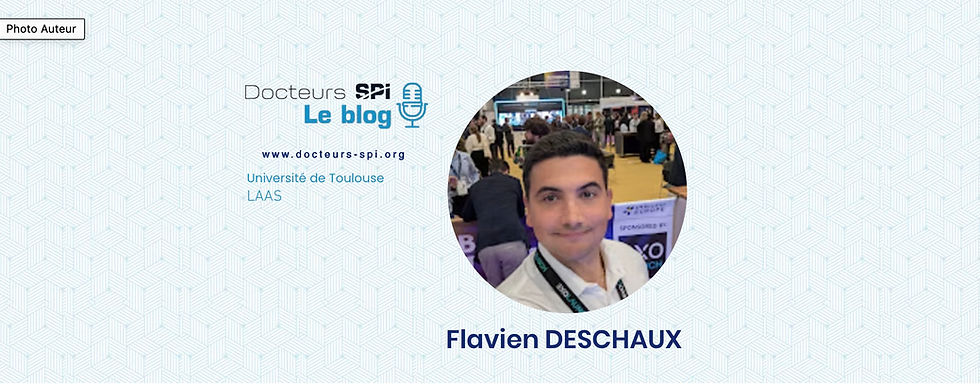A Ph.D. encompasses more than just scientific advancement!
- Nitish CHANDRAPPA

- 30 mai 2024
- 4 min de lecture
Dernière mise à jour : 29 sept. 2024

Merci beaucoup d'avoir accepté l'interview.
Could you please describe your background?
Originally from Bengaluru, the garden city of India, I obtained a bachelor's degree in mechanical engineering in 2017. However, I was always drawn more to mathematics and computer programming than the core mechanical field itself. At the same time, I didn't want to completely abandon my mechanical background. As I contemplated career-defining decisions, I discovered an international master's program in Nantes, France, offered by Centrale Nantes. This program focused on "computational mechanics", a specialization that perfectly balanced mechanics, scientific programming, and mathematics. Knowing it was the perfect fit, I took the leap and embarked on this international journey, stepping outside my comfort zone. This marked the exciting start of my French chapter in 2018.
How did this journey evolve into the pathway of pursing a Ph.D.?
Living in France can be quite challenging if you don't speak the language. However, my perspectives on life were transformed right away as I started meeting new international faces from different parts of the world with different experiences to share, both on a personal as well as a professional level. During my master's program, the coursework kept me highly engaged as I explored the computational aspects of well-established physics laws and the mechanical principles from my engineering background. As I delved into the various layers of computational modeling and the associated scientific computing languages, I began to realize the extensive potential of this specialization. Computational mechanics is one of the most wide-scoped and diverse field, offering a broad range of opportunities for academic research. The two years of my master's program felt like a delicious dish that was undercooked, leaving me eager to explore deeper into the various numerical approaches for different physical aspects. This hunger largely contributed to my decision to pursue academic research in the form of a Ph.D. Additionally, some of my professors during my master's program had an inspiring aura that motivated me to follow in their footsteps. On a personal level, I realized that a thesis would also give me ample time to immerse myself in French culture, learn the language, and enhance my professional portfolio. So, I never had second thoughts about my choice to pursue a Ph.D.
Please briefly describe your thesis subject.
Just as my life transformed when I left my comfort zone in India, materials undergo phase transformation when they are rendered thermodynamically unstable. In other words, when the materials leave their existing comfort zone (equilibrium) for thermodynamic reasons. As they transform, they tend to establish a new comfort zone (a different equilibrium state), a new phase with different characteristics that could impact the material properties. The objective of my thesis was to computationally model various changes that transpired in the microstructure of a material (metallic in particular) during this phase transformation. While this was not a new problem in the state-of-the-art, the novelty of my thesis lay in the numerical approach used to simulate this phenomenon. This again emphasizes the endless research opportunities in this diverse field.
Doing a PhD is not an easy undertaking. What is your impression of your time as a Ph.D. student?
As the title suggests, the consequences of pursuing a Ph.D. extend beyond scientific development. I believe it has a significant impact on one's personality development. A crucial aspect of being a successful Ph.D. student is maintaining sustained motivation. It involves the ability to bounce back with renewed energy and spirits when faced with roadblocks, and the eagerness to explore new ways of solving problems even after experiencing multiple setbacks. A Ph.D. cultivates an open mind and helps to avoid tunnel visioning. It strengthens the mind to be resilient, persistent, and enhances problem-solving abilities. Through various experiences of presenting and defending your work in conferences and seminars, the self-confidence is bolstered. Most of these traits are vital for thriving in a competitive professional environment. Another important aspect of successfully completing a Ph.D. is being able to detach yourself from time to time and engage in other activities. I consider myself fortunate to have had some supportive French colleagues (or friends, I should say) who played a crucial role in significantly improving my French language skills (to almost C1) and deepening my understanding of French culture. I am grateful to my Ph.D. friends for involving me in various activities that helped keep my mind fresh. So, in my experience, completing a Ph.D. thesis not only enhanced my academic skills but also played a significant role in personal growth, shaping me into a resilient individual. All of these experiences contributed to developing a strong professional outlook as I embarked on my job search after completing my Ph.D.
Can you briefly describe your career path after PhD?
With years of academic research experience and autonomy under my belt, I began to yearn for a taste of the industrial side of things. As a Ph.D. student, the focus is often on satisfying oneself and a small group of individuals directly involved in the project. However, in an industrial setting, there's a unique opportunity to fulfill the needs of a broader customer base and tailor contributions accordingly. Towards the end of my Ph.D. contract, I had already initiated my job hunt. Having a clear idea of what I was looking for helped me tailor my job applications accordingly. I aimed for a research and development role in an engineering software development company. Today, I hold the position of R&D Engineer at ESI Group (Keysight) in France, where I contribute to their in-house numerical solvers through development activities.
To all the aspiring young researchers out there, I wish you the very best on your journey! Remember, it's a marathon, not a sprint. If you have any queries or need advice, feel free to reach out to me on LinkedIn.




Commentaires